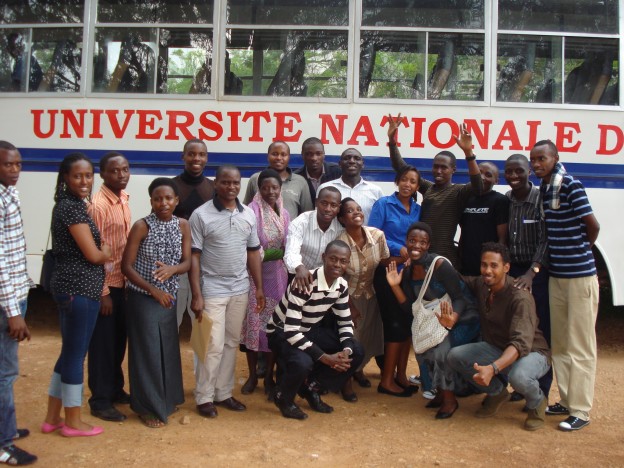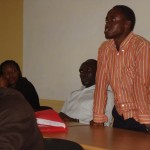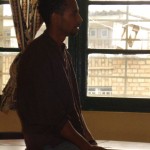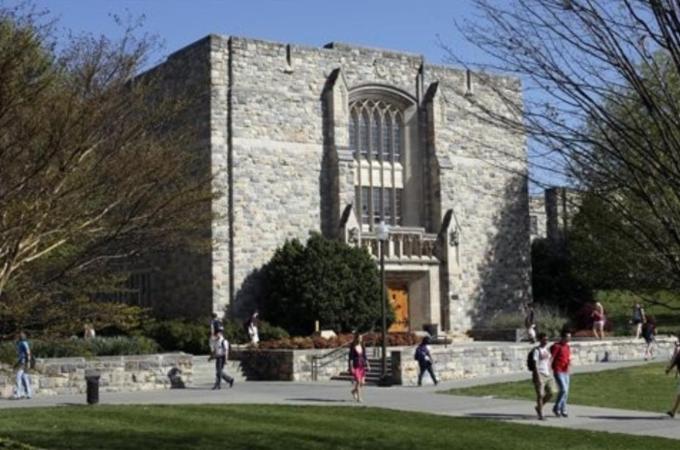Ryan Anderson: First of all, thanks for doing this interview. Let’s start off with the basics: Why anthropology? How and why did you end up in this field?
Sarah Kendzior: I got interested in anthropology while working as a research assistant for an anthropologist, Nazif Shahrani, while getting my MA in Central Eurasian Studies at Indiana University. Before I was an anthropologist, I was a journalist, but I was frustrated with the superficiality of foreign coverage. Journalists often cover foreign conflicts without knowing foreign languages, talking to local people, or examining the history and culture of the place they visit. I wanted to do things differently.
In 2004, I used to joke that anthropology was journalism with more work and less money. Of course, now there is no money in journalism either, but my point still stands. Ethnography is journalism that takes too long. I mean that not pejoratively but as an affirmation of the discipline’s values –– long-term observation; scrutiny of methodological practice; respect for history; commitment to understanding local beliefs and traditions.
I got spoiled working for Dr. Shahrani. He is an outspoken intellectual who spares no criticism of systems that he finds corrupt – including academia. He saw anthropology not as an abstraction removed from public life, but as a source of insight from which the public could benefit. In 2004, at the height of the “war on terror” and political propaganda against Muslims, this seemed a worthy goal. Dr. Shahrani is also very funny and honest and therefore left me with an erroneous impression of what anthropology, as a disciplinary institution, is like. I applied to PhD programs in the fall of 2005. In my application essay, I wrote: “I am not only interested in writing about the world, but for it as well.” This is still true. In retrospect, it is surprising I got in so many places.
RA: And how was your experience in graduate school? What’s your overall assessment of grad student life in anthropology?
SK: I can’t separate my grad school experience from other things going on in my life at the time. During graduate school I wrote six peer-reviewed journal articles, one policy paper, one dissertation – and had two children. My daughter was born at the end of my first year, in 2007, and my son was born as I finished my dissertation in 2011.
I was not a typical graduate student, and I didn’t have a typical graduate student life, so I’m probably not the best person to assess it. But on a personal level, it was fine. Because I’ve written critically about academia, people tend to assume I had a bad time in graduate school. This is not the case. I entered academia from the working world — graduate school felt like a luxury. My department supports its students well, and I had free tuition, a decent stipend, research money, and travel money for conferences. I worked on my own time on projects of my own choosing. I love to research and write and I enjoyed writing the dissertation.
Graduate school was easy. It was the non-existent future that I was working toward that was the problem. Every grad school path is unique, but almost all lead to the same dead end: a contingency market in which you must have both personal wealth and a willingness to accept your own exploitation to stay in the game.
I would never tell anyone not to go to graduate school. It is a personal decision, and there are many reasons to go. But I would tell them not to go to graduate school believing that your performance in graduate school has anything to do with your ability to find a full-time academic job. Academia is closer to a Ponzi scheme than a meritocracy.
RA: Looking back, is there anything you would change about your experiences in graduate school? Anything that you think should be done differently about how we train and teach graduate students?
SK: Graduate students live in constant fear. Some of this fear is justified, like the fear of not finding a job. But the fear of unemployment leads to a host of other fears, and you end up with a climate of conformity, timidity, and sycophantic emulation. Intellectual inquiry is suppressed as “unmarketable”, interdisciplinary research is marked as disloyal, public engagement is decried as “unserious”, and critical views are written anonymously lest a search committee find them. I saw the best minds of my generation destroyed by the Academic Jobs Wiki.
The cult mentality of academia not only curtails intellectual freedom, but hurts graduate students in a personal way. They internalize systemic failure as individual failure, in part because they have sacrificed their own beliefs and ideas to placate market values. The irony is that an academic market this corrupt and over-saturated has no values. Do not sacrifice your integrity to a lottery — even if you are among the few who can afford to buy tickets until you win.
Anthropology PhDs tend to wind up as contingent workers because they believe they have no other options. This is not true – anthropologists have many skills and could do many things – but there are two main reasons they think so. First, they are conditioned to see working outside of academia as failure. Second, their graduate training is not oriented not toward intellectual exploration, but to shoring up a dying discipline.
Gillian Tett famously said that anthropology has committed intellectual suicide. Graduate students are taught to worship at its grave. The aversion to interdisciplinary work, to public engagement, to new subjects, to innovation in general, is wrapped up in the desire to affirm anthropology’s special relevance. Ironically, this is exactly what makes anthropology irrelevant to the larger world. No one outside the discipline cares about your jargon, your endless parenthetical citations, your paywalled portfolio, your quiet compliance. They care whether you have ideas and can communicate them. Anthropologists have so much to offer, but they hide it away.
I got a lot of bad advice in graduate school, but the most depressing was from a professor who said: “Don’t use up all your ideas before you’re on the tenure track.” I was assumed to have a finite number of ideas, and my job as a scholar was to withhold them, revealing them only when it benefited me professionally. The life of the mind was a life of pandering inhibition.
I ignored this along with other advice – don’t get pregnant, don’t get pregnant (again), don’t study the internet, don’t study an authoritarian regime – and I am glad I did. Graduate students need to be their own mentors. They should worry less about pleasing people who disrespect them and more about doing good work.
Because in the end, that is what you are left with – your work. The more you own that, the better off you will be. In the immortal words of Whitney Houston: “No matter what they take from me, they can’t take away my dignity.” And in the equally immortal words of Whitney Houston: “Kiss my ass.” Both sentiments are helpful for navigating graduate school.
Academic training does not need to change so much as academic careerism. There is little sense in embracing careerism when hardly anyone has a career. But graduate school can still have value. Take advantage of your time in school to do something meaningful, and then share it with the world.
RA: How have things been for you since you graduated? What has it been like to move beyond graduate school and academia?
SK: I’m not sure becoming the poster girl for the collapse of higher education means moving beyond academia, but overall things have gone well — albeit not in a way I had expected. I did an interview on this topic for From PhD to Life, and people can read about it there.
RA: Earlier you mentioned an adviser who sees anthropology as something that should not be removed from public life–as something that can benefit the public. Do you share a similar vision of the discipline? What’s your take on the role of anthropology in public life?
SK: Anthropology benefits the public. Unfortunately, it is blocked from the public, and anthropologists who engage with the public – people like David Graeber – tend to be shunned by other anthropologists, to the point where they lose their jobs. This makes younger anthropologists afraid of public engagement, even though they have valuable insights to share.
Anthropologists complain about politics and the media, but they rarely engage with either. Then they wonder why their voices are not being heard. The most obvious way anthropologists can increase their influence is by writing online. I don’t mean writing in places like Anthropology News — where you have to pay an exorbitant membership fee to leave a comment – but on real blogs, on Twitter, on mainstream media sites, and in open access journals. Publishing reprints of paywalled articles is also a good idea, and is usually legal after a period of time. I did an interview about the benefits of reprinting journal articles online with Academia.edu, which you can read here.
Anthropologists tend to forget that tenets basic to our discipline – for example, that race is a social construct and not a biological determinant of behavior – come as revelations to a lot of people. Issues of racial and religious discrimination are among the many areas where anthropologists can have a powerful voice.
I recently wrote an article for Al Jazeera, “The Wrong Kind of Caucasian”, that had a complicated premise but a simple conclusion: do not condemn people on the basis of their ethnic background or country of origin. It was read by half a million people and shared on Facebook 57,000 times. I got letters from people saying I had changed their preconceptions and that they were going to keep an open mind about race, ethnicity and immigration. It felt good to make a difference at a politically heated time.
Academics justify the paywall system by saying the public is not interested in academic research. I argue that the public has had no opportunity to decide for themselves, since access to research has always been blocked. But I have faith in the ability of non-academics to understand and appreciate academic work. Given our current political and economic situation, anthropology may be of particular interest. More than any other discipline, it tackles issues of power and corruption, paying attention not only to the powerful, but to the struggling and marginalized.
Except, of course, when it comes to the struggling and marginalized anthropologists. Rarely have I seen a group more oblivious to their own hypocrisy than the “enlightened” anthropologists ignoring the adjunct crisis. You would think such incredible structural inequality would be interesting, at least, to the anthropological mind. I know it is interesting to me.
RA: You’re writing for a lot of non-academic venues these days–Al Jazeera and so on. How is this different from writing for academic venues and audiences?
SK: Hundreds of thousands of people read it. That is the main difference. I still write on many of the topics I studied while getting my PhD — digital media, politics, Central Asia. Stylistically, there is little difference between my Al Jazeera articles and my academic articles. The idea that academic writing needs to be abstruse is a myth. I had a pretty easy time publishing in academia — no reviewer criticized my writing style or suggested I use more jargon.
Because so many people read my work, I get a lot more feedback. Sometimes it is overwhelming. Al Jazeera is a great place to write because it has a huge international audience – I get email and tweets from people around the world, and like hearing their perspectives
That said, I enjoyed academic writing too. I don’t find it hard to move between different audiences, in part because I don’t make a distinction. Many of the people who like my Al Jazeera articles are academics; many of the people who like my academic articles are not.
RA: Above, you highlighted the fact that many anthropologists complain about their voices not being heard, yet ironically they often don’t engage much with politics or the media. To me, this persistent disengagement paves the way for attacks on social science by the likes of Tom Coburn and Florida Governor Rick Scott. We’ve essentially dug our own grave when it comes to public engagement–it’s easy to discount a highly insular, often silent discipline that few people have ever heard anything about. So, in order to wrap up this interview I am going to ask you two simple questions that I hear all the time from non-anthropologists: 1) Anthropology? What the hell is anthropology?; and 2) What are you going to do with that?
SK: You are right that academics’ lack of public engagement opens the door to political attacks. I wrote an article about this for Al Jazeera called Academic funding and the public interest.
I’m not going to answer “What is anthropology?” No one cares about our ontological debates. But here is how I would explain cultural anthropology to a layperson:
All of the social sciences – history, political science, economics, etc – study how people behave, form groups, and build a society. Each social science has its own way of figuring this out. Anthropologists believe the best way to find out what someone is thinking is to ask them. We respect that people in another community understand their own way of life better than outsiders do. We observe a community for a long period of time so that we don’t come away with hasty generalizations. We are careful when we write about others to put their words and their views before our own.
When you study anthropology, you learn about people and places that you might not otherwise. Anthropologists write about everyone – powerful and powerless, rich and poor, all races and nationalities. They explore how political decisions affect ordinary people, and how ordinary people influence politics. They look at how public perception is shaped, how social trends emerge, and how movements are formed. They ask what people expect from life, and what happens when they don’t get it.
Anthropology has a reputation for being exotic. But the point of anthropology is that exoticism fades when you get to know someone. Bigotry and prejudice fade too, which is why anthropologists used to be influential in reshaping ideas about race and ethnicity.
Anthropologists are interested in why people believe lies. For example, a large percent of Americans believe that Obama is a Muslim born in Kenya. For an anthropologist, it would not be enough to note that this is factually incorrect. They want to know why so many people believe it is true.
Anthropologists understand that the world often doesn’t run on facts, but on dreams and delusions, hopes and fears, imagination and ambition. They don’t dismiss anything as unimportant.
***
Now onto your second question — what are you going to do with that? First of all, higher education and the economy are both such disasters that you cannot assume any major or degree will guarantee you a good, secure life. STEM, liberal arts, law – no profession is safe. Industries are disappearing or being restructured out of existence. Practical training you get in college will likely be useless ten years from now. There are no safe bets.
So what is the point of an education? The point is to think critically, become an informed citizen, gain some specialized knowledge, gain broader insight into the world, and communicate well. Some people will say they don’t need to go to college to do this. I actually agree with that. But since college is a prerequisite for most jobs, you might as well get a solid education.
The best education is a broad education with an emphasis on primary sources, debate, and writing skills. I recommend that people study anthropology, but they should also study history, literature, religion, art, science, economics, sociology, political science, and other subjects. The constant assertion of disciplinary superiority is self-defeating. If the social sciences want to win the battle against people who want to defund us, we need to band together. We also would benefit intellectually if we read work outside our discipline and showed tolerance for alternate approaches.
I study Central Asia, a region of the world that is so understudied that there is a very small body of anthropological literature. As a result, most anthropologists draw not only from anthropological studies, but from the work of sociologists, historians, geographers and others. We also tend to read and cite non-academic work, since data on Central Asia is so limited. We have a supportive research community and no one’s knowledge is dismissed out of hand because of their background.
I also study the internet, and so I read broadly in communication, sociology, humanities and other fields. Yet when I write an article for an anthropology journal, I am expected to cite only other anthropologists. When I co-wrote a mixed-methods article with a quantitative communications scholar, and we got it published in the top communications journal, I was told by some anthropologists to leave it off my CV, because it showed I was interested in something other than anthropology. This is ridiculous. There is no need for this insecurity masked as insularity.
Anthropology is struggling as a discipline because anthropologists bank on a lofty reputation that they don’t really have while simultaneously shielding their work from the public. The public is not going to believe you have something worthy to say when you refuse to let them in on the conversation. Don’t be so afraid, anthropologists. You of all people should know the world is not what it seems.



















